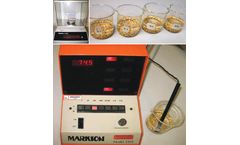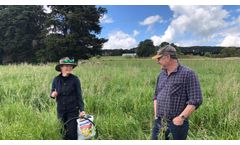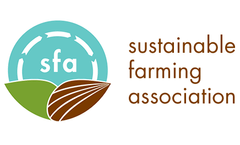Refine by
Crop Species Articles & Analysis
18 news found
One-stop service for seeding testing covering all steps including sampling, testing, surveys, verification, and monitoring is available at Lifeasible. A wide range of crops (agriculture crops, grasses, native species, forbs, vegetables, flowers, herbs, and shrubs) are covered by the seed testing service by Lifeasible through high-quality ...
Jade said it aimed to make decisions easier for farmers and to make sowing more successful for multi-species crops or any sowing operation. “It’s an easy-to-use tool and the categories are quite broad but it helps farmers to place their paddock in a scenario and make it easier to plan whether to do light, medium or heavy cultivation,” she said. ...
This free event features area farmer Scott Haase (above), who is practicing soil health principles like cover crops, more diverse species, reduction in soil disturbance and adding livestock. ...
The Sustainable Farming Association is again hosting its series of popular Cafe Chats, free events featuring area farmers who are practicing soil health principles like cover crops, more diverse species, reduction in soil disturbance and adding livestock. ...
Each day’s program will include discussions on soil health principles, cover crop species selection, interpreting Haney Test results, an overview of each farm operation, a rainfall simulator, fencing discussion, an overview of cover seeding and equipment, and much more. ...
Despite continuous improvements in farming practices, current crop yields are growing too slowly to keep up with the predicted increase in food demand. ...
This reduces crop yields and quality, and potentially affects food supply in some areas. ...
An International consortium of more than 30 research institutes, coordinated by scientists at INRA and CEA-Genoscope and associating CNRS and University of Evry, just succeeded in deciphering the complex genome of the recent oilseed rape1 (Brassica napus L, also known as rapeseed, rape or canola), the most important oilseed crop in Europe, Canada, and Australia. This scientific ...
Researchers surveyed pollinators visiting study plots in Berkshire, UK, and explored how sowing different seed mixes and using different management techniques affected the flowers produced and the pollinators visiting them. Overall, 84% of the crop species cultivated in Europe depend directly on insect pollinators. ...
The world’s first populations of glyphosate resistant wild radish will be announced at Perth’s Agribusiness Crop Updates, but researchers stress further cases can be minimised if farmers adopt diverse control strategies. ...
It also meant that farmers began to rely on just a few crop species. In India, for example, there were about 30,000 rice varieties before the Green Revolution. Today there are around 10 — the most productive types. Mono-cropping has left the three staple crops of the Green Revolution — rice, maize and wheat — ...
Using a mix of trees and crop species can help rejuvenate Pakistan's deteriorating forests, a study reported. ...
Speaking at a meeting with researchers at Makerere University in Uganda last month (4 July), Grady reported: "In May, through our grantees, more than a dozen varieties of four crop species — cassava, peanut, cowpea and sorghum — were released, most of them coming from Uganda, and the result of original breeding that made use of local germplasm plus ...
Agriculture depends on healthy ecosystems for services such as pollination for nearly 75% of the world’s crop species, freshwater, erosion control, and climate and water regulation. ...
Perennial, warm-season grasses are being evaluated as potential renewable energy crops. These species are well-suited for the production of biomass for energy applications because they utilize C4 photosynthesis and are perennial. ...
They say that a weed risk assessment (WRA) — which examines a plant's biology, geographic origin, known pest status and behaviour — can be used to predict whether a species of biofuel crop will become invasive, enabling countries to avoid environmental and economic losses. In the first quantitative study of the invasiveness of terrestrial biofuel ...
Forty years of crop sequencing trials have recently been collated by the Department of Agriculture and Food WA (DAFWA), giving Western Australian grain growers real insights into the rotational benefits of break crops. ...
More land is being used to grow fuel crops, and climate change and water scarcity are compromising the ability of agricultural lands to deliver quality produce. ...










